A key House committee has approved an infrastructure funding boost of more than $40 billion—including money for transit, highways, wastewater treatment and buildings—as part of the sweeping $3.5-trillion budget reconciliation package the chamber is now assembling.
After a 15-hour meeting that wrapped up in the wee hours of Sept. 15, the Transportation and Infrastructure, or T&I, Committee approved its portion of the broader reconciliation measure by a 37-29 vote, along party lines.
View section-by-section summary of committee bill here. [Excludes amendments approved in Sept. 14-15 markup.]
Other important House committees completed markup sessions on Sept. 15 on their parts of the reconciliation measure. They include Energy and Commerce, which besides overseeing energy also is responsible for the drinking water program, and Ways and Means, which has jurisidiction over the revenue-raising tax changes to offset spending increases.
Still to come is a House floor vote on the overall package and action in the Senate, which is just starting to craft its own version of the legislation.
If enacted, the T&I panel's recommended infrastructure funds would supplement the $1-trillion bipartisan Infrastructure Investment and Jobs Act (IIJA) that the Senate approved on Aug. 10.
Will the Funding Survive?
But as the reconciliation measure makes its way through Congress, it's unclear whether all, or even any, of the House T&I funds will survive in the final version.
Steve Hall, the American Council of Engineering Companies' senior vice president for advocacy, said in an interview. "Many of the elements of the T&I package have I think a pretty good shot" of being included in the eventual bill. He cites T&I's $10 billion for transit as an example.
But Hall says, "It really comes down to what happens in the Senate and when serious negotiations start to happen on the size of the package."
He says that the version that clears the House is expected to be in the $3.5-trillion range. "But we also know that's not going to clear the Senate," he adds.
House T&I’s top Republican, Sam Graves of Missouri, is more bearish. He said in a statement after the committee vote, “Much of what was included in today’s partisan package will wind up on the cutting room floor....”
Graves says that, for one thing, the T&I infrastructure funds would run counter to President Joe Biden’s reported pledge not to revisit in the reconciliation bill provisions already covered in the IIJA.
At least some of the T&I bill's provisions reflect committee Chair Peter DeFazio’s views that the Senate IIJA has too little funding in several areas, including transit, high-speed rail and wastewater, and lacks tough-enough steps to combat the effects of climate change.
DeFazio said that T&I leaders have been told that the Senate-approved bill is “sacrosanct” and cannot be added to. Thus, he turned to the reconciliation bill as a vehicle to address what he sees as IIJA shortcomings.
Highlights of T&I Committee Bill
In all, the T&I Democrats say the bill would provide almost $60 billion. But not all of that would go for design and construction. ENR calculates the construction-related funding at $41.8 billion.
Major provisions include $10 billion for what DeFazio, an Oregon Democrat, calls a “novel” program to use transit projects to provide greater access to affordable housing for residents of disadvantaged localities.
It would be managed by the Dept. of Transportation's Federal Transit Administration and the Dept. of Housing and Urban Development, he says.
The bill also includes $4 billion for Federal Highway Administration grants to reduce carbon pollution in surface transportation, the largest carbon-emitting sector by reducing dependence on single-occupancy vehicles and providing zero-emissions transportation, according to the bill. Of that, $1 billion would be grants to states and $3 billion would be grants to cities, counties and other jurisdictions.
Another provision calls for $4 billion to promote neighborhood access and equity. In his infrastructure framework unveiled in March, President Joe Biden had proposed $20 billion for “reconnecting neighborhoods." But the Senate-passed IIJA has only $1 billion for such purposes.
In addition, the T&I bill has $6 billion for projects that are “local surface transportation priorities”—another term for earmarks.
High-speed passenger rail would receive $10 billion. DeFazio noted the established high-speed rail lines in China, Europe and Japan, and said. "Our rail system in America is pathetic. And we need to rectify that.”
In non-transportation areas, the Commerce Dept.'s Economic Development Administration would receive $4 billion to promote “regional economic growth clusters,” in economically struggling localities, though it's unclear how much, if any, of that total would go for construction. Public works projects would receive $500 million.
The General Services Administration would receive $1 billion to convert federal facilities to “high-performance green buildings.”
Other allocations include $291 million to the Federal Emergency Management Agency for grants to states, localities and tribes to implement and enforce codes, specifications and standards for hazard-resistant designs. FEMA also would receive $495 million for a new hazard-mitigation revolving loan fund.
The bill also includes $1 billion to design or build new or replacement U.S. Coast Guard facilities that might be affected by climate change.
DOT's Maritime Administration would receive $2.5 billion to enhance port infrastructure and supply-chain resilience.
At the Environmental Protection Agency, the committee's legislation would allocate $2 billion for grants for sewer overflow and stormwater reuse projects.
Transportation and Infrastructure arguably is the House panel with the largest impact on construction. But Hall says, "There's a whole package of provisions that address the built enviroment beyond the T&I Committee."
Among other committees' construction provisions, AGC’s Turmail points to the Energy and Commerce panel, whose reconciliation bill section includes $30 billion to replace drinking-water systems’ lead service lines.
Ways and Means also voted to bring back the popular, but now defunct, Build America Bonds program, through which states and localities issued bonds that supported more than $181 billion in financing for schools, bridges, hospitals and other projects. The program ran from April 2009 through December 2010
On the other hand, construction groups aren't happy about Ways & Means' proposed tax increases, which include a boost in the corporate tax rate.
Eyes on Highway-Transit Bill Deadline
But as construction and engineering groups monitor the reconciliation measure’s progress, their main focus is seeing the Senate-approved infrastructure bill become law.
The next step is a House floor vote. A key deadline is just around the corner. The infrastructure bill's cornerstone is its $303-billion highway-transit reauthorization provision. The current surface transportation law is due to expire on Sept. 30.
House Speaker Nancy Pelosi provided encouraging words about the outlook for the IIJA. She said on Aug. 24, “I am committing to pass the bipartisan infrastructure bill by Sept. 27,”
Industry officials are getting positive signals about an IIJA floor vote. Brian Turmail, Associated General contractors said via email, “House leadership has assured us that they can meet this deadline.”






Post a comment to this article
Report Abusive Comment